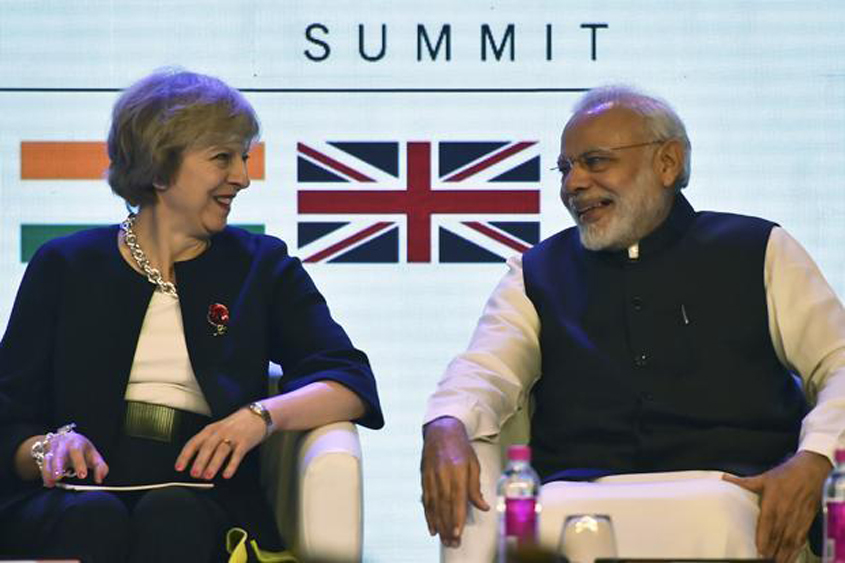 The withdrawal of Britain from the European Union provides a golden opportunity for India to take the lead in engaging with the Commonwealth. Mutuality of interests means it is opportune time to come together again.
The withdrawal of Britain from the European Union provides a golden opportunity for India to take the lead in engaging with the Commonwealth. Mutuality of interests means it is opportune time to come together again.
In the swirl of post-Brexit debate, the role of, and the implications for, the Commonwealth have been raised with increasing frequency in the United Kingdom and by President Trump in the United States. The resurgence of a sphere of influence composed of the free, equal and independent English-speaking nations is antidote to the perils associated with economic-failure, oppression and terrorism.
Back in 1972, the views in the Commonwealth, including that of India, were hostile to Britain joining the EU (then the EEC). Recent disapproval of Britain’s withdrawal is evidence of how radically world trade conditions and its inherent vested interests have changed since.
The modern Commonwealth owes its origin to Indian hands. The Balfour Declaration of 1926, the Statute of Westminster of 1931 and the London Declaration of 1949 are important constitutional documents of the Commonwealth. The statute of Westminster was the legal basis for the grant of Indian Independence. The London Declaration of 28 April 1949 gave birth to the modern Commonwealth and completely changed its scope. Ireland declared itself a republic 10 days before the declaration and therefore left the Commonwealth, before the novel London Declaration was drafted by an Indian hand. Indian leadership at the time could have chosen to follow Ireland but crucially, it didn’t. India decided to remain in the Commonwealth. India’s membership of the Commonwealth as a republic was hard won. Although riddled with difficulties of the want of legal precedence, lack of keen interest and challenges posed by other members at the time, the efforts of Indian leadership, the triumvitrate of Gandhiji, Patel and Nehru succeeded to ensure that this common sense arrangement came into being. English has survived the test of time and has emerged as the leader in world currents of thought. This is partly why even the Chinese are learning English with a vengeance, as did Russians in previous decades. We need English so as not to be antediluvian. English as Rajagopalachari famously retorted to a journalist is India’s own; being a child of the Devi Sarasvati: a fine modern descendant of Sanskrit—the lingua franca when India commanded an extensive sphere of influence. India’s constitution is drafted in English, the state is run along the Westminster system of Parliamentary government and the legal system is based on the Common Law—all common characteristic features shared by Commonwealth member states. India is now the biggest democracy in the world and should engage with its natural partners.
Britain’s membership of the Common Market and then the European Union had eclipsed the possibility of the tremendous impact that the Commonwealth working together could produce. But now, mutuality of interests means it is the opportune time to come together again. The assumptions of 1972—that the UK’s prospects lay in Europe and not in the Commonwealth—are being turned on their head.
The EU has been described by David Howell, a former Commonwealth minister as “a mixture of supranational tendencies and intergovernmental cooperation”. The Commonwealth, on the other hand, has been described as deriving strength from the “extraordinary connectivity at countless non-governmental levels including flourishing business and professional links”, which “a common working language, common legal procedures, common accounting and commercial practices, and common cultural links both allows and reinforces.”
The Commonwealth is a much more organic union than any other international organisation based on the commonality of interests. It has become a standard-bearer in the cause of free speech, free markets and the fight against discrimination. Commonwealth countries have now have Britain over a barrel: Having decided to move away in 1972, she knocks on the doors of her old friends politely to be let back in. The UK will be careful to see that any trade deal works from the perspective of its Commonwealth partners as well. It realises that it can no longer be narrowly Anglo-centric. Successful trade and investment is a partnership of equals.
The Commonwealth network is the gateway to some of the fastest-growing new economies. According to a recent report, published by the Commonwealth Secretariat, Commonwealth trade and investment-flows of all kinds are now growing noticeably faster than overall world trends, and now account for some 15% of total world exports. The report also found a “Commonwealth Advantage” of up to 20% which is described as the practical economic value, in both trading and investment interchanges, of a shared language and systems between members when compared to non-Commonwealth nations.
Further deals could cover defence and security. Britain and NATO were not keen to consider this a possibility until Brexit. Now, the commonality of strategic interests, particularly in maintaining maritime security while combating fears over rise of international terrorism and extremist governments, could bring this to fruition. Even a multilateral pact could come into being; especially France made public its wish to join a Commonwealth defence pact in June this year.
Past legacy with a common working language will certainly help but much more proactive action from old friends to keep up the connection will be needed. A world that seemingly falls apart is paradoxically given the chance to come together as never before. A decisive strategy towards the Commonwealth is much needed for supporting multi-lateral engagements that brings opportunities like never before.
RKK is a lawyer and public-affairs consultant based in London and former Commonwealth public servant.

